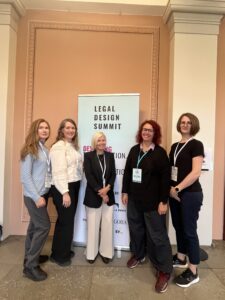Presenting the Research Council of Finland-funded Academy Fellowship ‘Agency in everyday Datafication’ (AgenDa)
In September 2025, the Research Council of Finland (RCF)-funded (decision no. 368166) four-year Academy Fellowship ‘Agency in everyday Datafication’ (AgenDa) started, led by Principal Investigator (PI) Dr Miriam Tedeschi. The project focuses on everyday datafication and data harms, their materialities and tangibilities. It investigates how design justice methods can help prevent, mitigate, and navigate such harms, support datafication literacy, increase human agency within the human-machine complex relationship, and, ultimately, advance data justice. AgenDa works across and intersects multiple disciplines, for instance: socio-legal studies, design justice, feminist digital geographies, relational philosophies, and media studies.
Background of AgenDa
Data dominate modern societies. Datafication (Mejias & Couldry, 2019) of everyday lives and spacetimes is pervasive (Cheney-Lippold, 2017). Everyday datafication refers to the process of quantification and organisation of the messiness of mundane practices (Lupton et al., 2018) through machine-processed digital information.
Datafication does not happen externally to us. It forms our own ‘selves’ (Kitchin, 2021; Ruckenstein, 2023; Tucker, 2023) and shapes our agency, or capacity to act and perform daily activities (Pink et al., 2018; Kitchin, 2025). This agency is not human-only: it is constantly negotiated and co-constructed with machines (Luo et al., 2024) in everyday datafication. Yet, despite the pervasiveness of these data-generating agencies as they become part of our own ‘selves’ and everyday lives, there is a striking paradox. Everyday data tend to be studied as elements external to us and disembodied. Specifically, datafication literacy (Sander, 2024)—the ability to meaningfully connect with our data and be aware of their effects in everyday life—privileges disembodied engagements with data (Lupton, 2017).
Thus, there is an urgent need to push data into tangibility and actionability to increase awareness of such effects; react to and resist data harms (Redden, Brand, & Terzieva, 2020); and, ultimately, support human agency over data to advance data justice (Dencik et al., 2019). This is what AgenDa will focus on in the next four years.
AgenDa’s hypothesis, research questions, and aim
The hypothesis of AgenDa is that an embodied datafication literacy approach would allow for a more comprehensive understanding of data agencies, and in the end, strengthen human capacity to act on and with machines and mitigate data harms. Accordingly, AgenDa addresses three interrelated research questions:
- With what concepts and methods do digital geographies, feminist philosophies, socio-legal studies, and design justice research in and beyond critical data studies explore data agencies and their physicalities and tangibilities?
- How can qualitative, justice-oriented design methods support an embodied datafication literacy and make the multiple aspects (spaces, times, bodies, and experiences of (in)justice) of data agencies tangible and actionable?
- How does interconnecting these multiple aspects and making them embodied, tangible, and actionable contribute to advancing transdisciplinary theories and methods for studying data agencies?
Ultimately, the aim of AgenDa is to increase human agency over data by developing embodied and justice-oriented approaches to datafication literacy.
Next steps
The project has just started, so the research questions are still open. Thus, AgenDa’s researchers will, in the next years, 1) survey, for instance, socio-legal studies, design justice, feminist digital geographies, relational philosophies, and media studies to map how data’s tangibilities and physicalities have been investigated; 2) use justice-oriented mixed methods to experiment with data’s tangibilities and actionability in classroom settings.
On this, the PI will be working with a Doctoral researcher. There is thus an open call for a Doctoral Researcher (fully funded for three years) within AgenDa (submissions until 19 December 2025): https://ats.talentadore.com/apply/vaitoskirjatutkijan-tehtava-suomen-akatemian-rahoittamassa-hankkeessa-agency-in-everyday-datafication-agenda/ZqJBr2?lang=en&UTUID=21020
The Doctoral researcher can develop their own research project within AgenDa’s general framing.
AgenDa is carried out at the Faculty of Law, University of Turku, within the research environment ‘Law, Space and Justice’ and the Faculty’s Focal Point ‘Law, Information, and Technology‘.
About the Author

Miriam Tedeschi (Academy Research Fellow, Faculty of Law, University of Turku) is a legal geographer and ethnographer. She has recently concluded her RCF-funded project ‘Justice in Digital Spaces’ (JuDiCe) (2022–2025), and started the new RCF project ‘Agency in everyday Datafication’ (AgenDa) (2025–2029). Tedeschi has multiple years of experience in carrying out ethnographic work and using design-related methods in a variety of spatio-techno-legal contexts.
Related works:
Luo, Y., Tedeschi, M., Gkouskos, D., & Resmini, A. (2024). Co-constructing agency in human-AI interactions. In: Adjunct Proceedings of Association for Computer Machinery (ACM) Nordic Conference on Human-Computer Interaction (NordiCHI ’24). New York: ACM, 1–5. https://doi.org/10.1145/3677045.3685459. Self-archived Open Access version available here: https://research.utu.fi/converis/portal/detail/Publication/458359058?lang=en_GB
Tedeschi, M. (2023). Embracing difference: On law, code, and space. Culture, Theory and Critique, 63(1): 26–42. https://doi.org/10.1080/14735784.2023.2190902
Tedeschi, M. (2024). Datafication and urban (in)justice: Towards a digital spatial justice. Geography Compass, 18(6): e12763. https://doi.org/10.1111/gec3.12763
Tedeschi, M., & Rochielle Sievert, J. (2024). Spatial justice in design research: A transdisciplinary discourse. In: Gray, C., Hekkert, P., Forlano, L., & Ciuccarelli, P. (eds.) DRS (Design Research Society) 2024. 24–28 June, Boston. https://doi.org/10.21606/drs.2024.116
Tedeschi, M., & Viljanen. (2023). Lost in transduction: From law and code’s intra-actions to the right to explanation in the European data protection regulations. Law & Critique, 35: 635–652. https://doi.org/10.1007/s10978-023-09352-7
Further resources:
Public description of the project on the RCF website: https://research.fi/en/results/funding/83415
Project’s website: https://www.utu.fi/agenda
Photo by Markus Winkler on Unsplash (https://unsplash.com/photos/scrabble-tiles-spelling-out-the-word-data-on-a-wooden-surface-z6hKpyCuQME)







